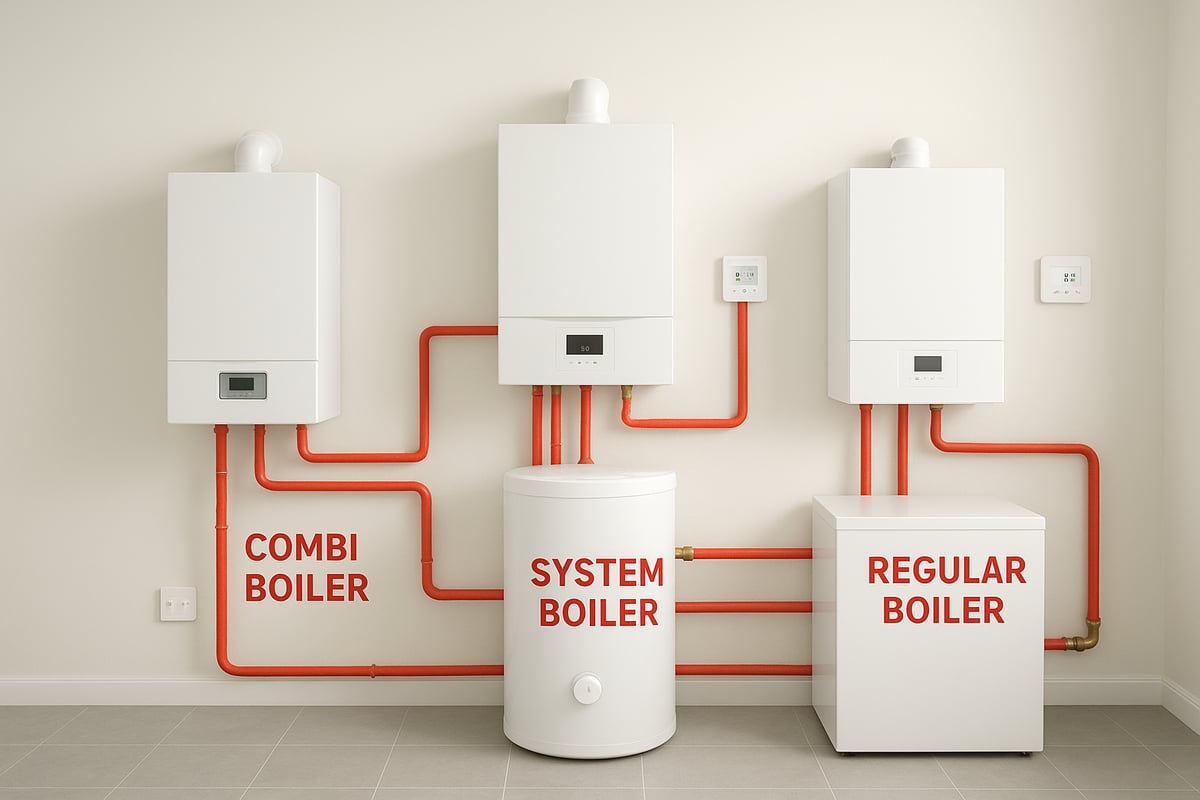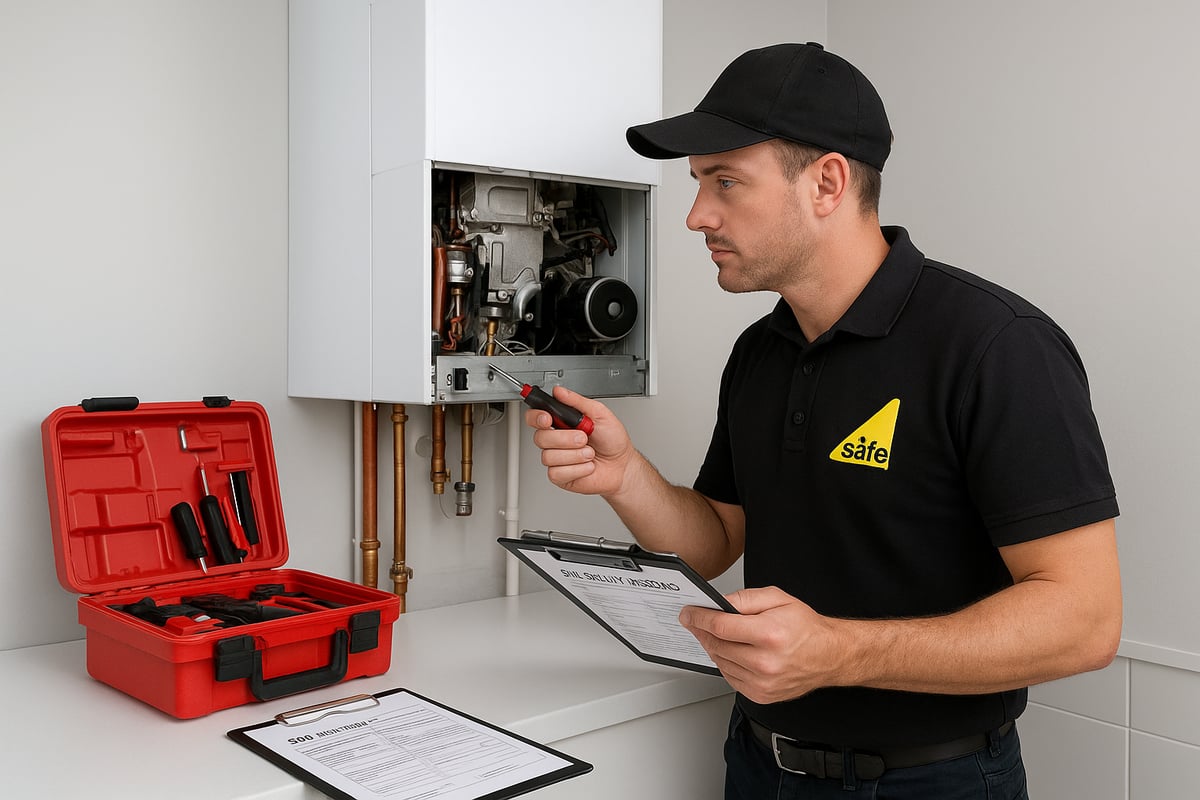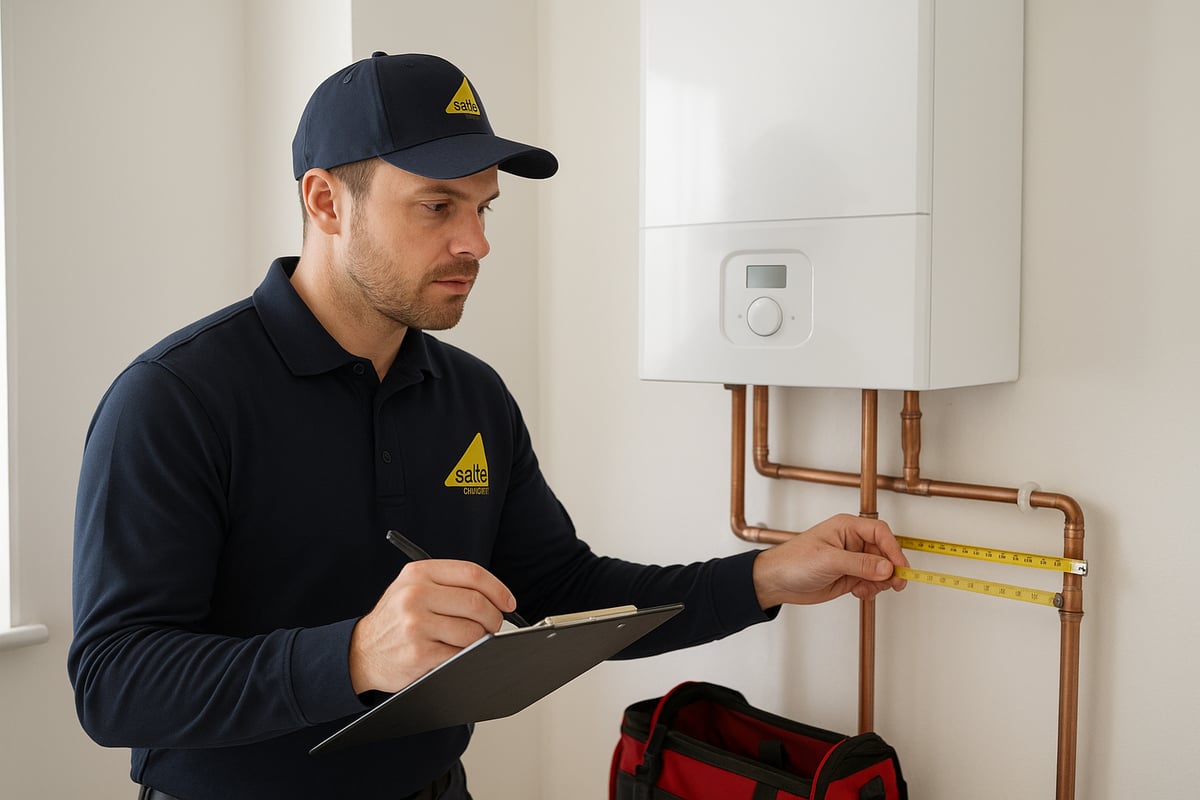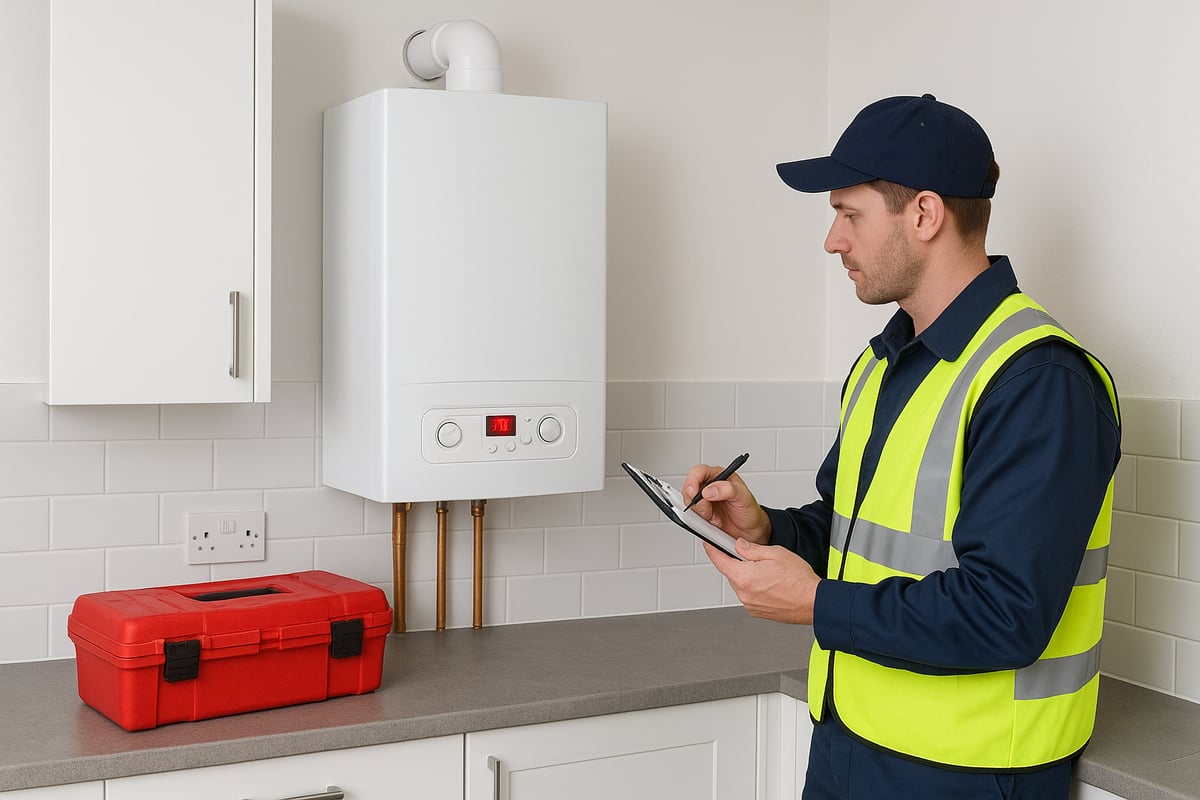Boiler Installations Guide: Your 2025 Step-by-Step Handbook
With energy costs soaring and UK regulations evolving, 2025 is a crucial year for homeowners considering new boiler installations. Upgrading now means enjoying greater energy efficiency, lower bills, and a warmer, more comfortable home.
Modern systems are not only eco-friendly but can also boost your property's value. As requirements change, staying informed helps ensure your investment is compliant and future-proof.
This step-by-step handbook will guide you through every stage of boiler installations, making the process straightforward and stress-free. From choosing the right system to understanding legal requirements, costs, and maintenance, this guide demystifies what to expect and how to get the best results.
Understanding Boiler Types and Choosing the Right One
Selecting the right boiler is a critical first step for successful boiler installations in 2025. With energy bills rising and efficiency standards tightening, understanding your options is more important than ever. The right choice will ensure long-term comfort, lower running costs, and compliance with new UK regulations.

Main Boiler Types: Combi, System, and Regular
There are three primary boiler types used in UK homes: combi, system, and regular (also called conventional) boilers. Each is designed for specific property sizes and hot water demands.
| Boiler Type | Pros | Cons | Best For |
|---|---|---|---|
| Combi | Space-saving, instant hot water, no tanks | Limited flow for multiple showers, not ideal for large homes | Flats, small to medium houses |
| System | Good for multiple bathrooms, fast hot water | Needs a cylinder, more space required | Medium to large houses |
| Regular | Works with old heating systems, good for high demand | Requires tanks, most space needed | Large, older homes |
Combi boilers are the most popular choice for boiler installations, making up around 70% of new systems in the UK. Their compact size and efficiency suit many modern properties, but they may struggle with high simultaneous hot water use.
Pros and Cons for Different Homes
When planning boiler installations, property size and water demand are key. For a single occupant or couple in a flat, a combi boiler provides instant hot water and saves space. For families in a three-bedroom house, a system boiler may be preferable, as it can handle multiple showers at once. Regular boilers are mainly suited to older homes with existing tanks and high water usage.
UK Efficiency Standards for 2025
By 2025, all new boiler installations must meet stricter efficiency rules, with condensing models now the minimum standard. These boilers recover heat from exhaust gases, reducing waste and lowering carbon emissions. New systems must also be compatible with smart controls and, in some cases, renewable energy sources. For official details, see the Improving boiler standards and efficiency government consultation.
Key Decision Factors
When considering boiler installations, take into account:
- Property size and number of bathrooms
- Hot water usage patterns
- Available space for cylinders or tanks
- Future plans, such as home extensions or increased occupancy
A professional heating engineer can help you assess the best match for your home. For example, in a typical three-bedroom house, a system boiler may cost more upfront than a combi, but it provides better performance for families with higher hot water needs.
Example: Combi vs System Boiler in a 3-Bedroom Home
Let’s compare combi and system boilers for a 3-bed semi-detached house:
| Feature | Combi Boiler | System Boiler |
|---|---|---|
| Installation Cost | £1,800-£2,200 | £2,200-£2,800 |
| Hot Water Flow | Lower for multiple taps | High, supports multiple bathrooms |
| Space Needed | Minimal | Cylinder required |
| Running Costs | Lower for small families | Efficient for larger households |
This comparison highlights why it is essential to match boiler installations to your family’s needs.
Smart Boilers and Renewable Integration
Modern boiler installations increasingly feature smart controls, allowing you to manage heating from your phone. Many new boilers are also designed to integrate with solar panels or heat pumps, making your home more future-proof and reducing reliance on gas.
Market Share and Environmental Impact
Combi boilers dominate the UK market, accounting for roughly 70% of all new boiler installations. This shift is driven by their efficiency and space-saving design. Importantly, modern condensing boilers can cut your carbon footprint by up to 30% compared to older models.
If you are interested in maximising eco benefits, consider reading this guide on how to choose an eco-friendly boiler. Understanding the environmental impact of your choice will help you make a decision that benefits both your home and the planet.
Choosing the right boiler is a vital step for efficient, future-proof boiler installations in 2025. Take time to assess your needs, consider new regulations, and consult with a qualified engineer to ensure long-term comfort and savings.
Legal Requirements and Preparations for Boiler Installation
Legal compliance is the cornerstone of safe, efficient boiler installations in the UK. With new regulations taking effect in 2025, homeowners need to be more vigilant than ever. Ignoring these requirements can lead to fines, invalid insurance, and safety hazards.

Understanding 2025 UK Boiler Regulations
The UK's Building Regulations Part L set strict efficiency and safety standards for all new boiler installations. In 2025, these rules have become even more rigorous, reflecting the nation’s push for energy efficiency and carbon reduction. Only condensing boilers with high seasonal efficiency are permitted, and all work must comply with up-to-date standards.
Gas Safe Register membership is legally required for anyone carrying out boiler installations involving gas. This ensures that all work meets safety and performance criteria. Homeowners should verify their installer’s credentials before any work begins.
Certified Engineers and Legal Documentation
Hiring a certified Gas Safe engineer is not just best practice, it is a legal necessity for boiler installations. Unregistered work can result in hefty fines and invalidate both home insurance and boiler warranties. For example, fines can exceed £5,000 for non-compliance.
Documentation is equally important. After installation, homeowners must receive a Building Control notification and register the boiler warranty. Use this table to track essential paperwork:
| Document | Who Provides | Why Needed |
|---|---|---|
| Gas Safe Installation Certificate | Installer | Legal compliance, safety proof |
| Building Control Notification | Installer/Homeowner | Local authority record |
| Boiler Warranty Registration | Installer/Homeowner | Activate manufacturer warranty |
Home Preparation for Boiler Installations
Proper home preparation helps ensure smooth boiler installations. Clear the area around the current boiler, making sure there is access to pipework, radiators, and the flue. Remove any personal items or obstructions.
Before installation, assess if your existing pipework and radiators are compatible with the new boiler. Some older systems may need upgrades to meet modern efficiency standards. Discuss these points with your installer during the initial survey to prevent delays.
Minimising Disruption and Common Mistakes
Planning ahead minimises disruption during boiler installations. Schedule the work at a time that suits your household and communicate clearly with your installer. Consider relocating pets or arranging alternative heating if needed.
A common mistake is overlooking legal requirements or failing to check credentials. According to the Energy Saving Trust, 85% of UK homeowners are unaware of the full legal requirements for new boilers. To avoid pitfalls and guarantee compliance, consider using trusted professionals such as those detailed in this boiler installation services overview.
Being proactive about legal and practical preparations ensures your boiler installations are safe, efficient, and fully compliant.
Step-by-Step Boiler Installation Process
A professional approach to boiler installations guarantees safety, compliance, and long-term efficiency. Understanding each step gives homeowners peace of mind, ensuring the process is smooth from the first survey to final handover.

Pre-Installation Survey and Quotation
The first step in boiler installations is a detailed pre-installation survey. A qualified heating engineer visits your home to assess the current heating system, measure room sizes, and discuss your requirements. This ensures the new boiler is correctly specified, compliant, and sized for your property.
During the survey, expect the engineer to:
- Inspect your existing boiler and pipework
- Check water pressure and flow rates
- Evaluate radiator condition and count
- Assess potential locations for the new boiler and flue
- Discuss your hot water and heating preferences
A typical survey checklist might look like this:
| Survey Checklist | Details |
|---|---|
| Boiler Type | Combi, system, or regular |
| Property Size | Number of bedrooms, bathrooms, radiators |
| Water Pressure | Mains pressure and flow rates |
| Pipework Condition | Signs of leaks, corrosion, or blockages |
| Flue Options | Existing or new flue route |
| Controls | Smart thermostat compatibility |
When comparing quotations for boiler installations, ask about what is included, such as parts, labour, disposal fees, and warranty terms. Always request itemised quotes to avoid hidden costs. Surveys and quotations typically take one to two hours, depending on property complexity.
Removal of Old Boiler and System Preparation
Once you accept a quote, the next phase of boiler installations involves safely removing the old boiler. The engineer will shut down the system, isolate gas and water supplies, and carefully drain the heating circuit.
Responsible disposal is crucial. Old boilers must be recycled or disposed of in line with WEEE regulations. This not only protects the environment but also ensures legal compliance.
Before installing the new system, the engineer will:
- Flush the pipework to remove sludge and debris
- Inspect for leaks or corroded pipes
- Check compatibility of existing radiators and valves
- Prepare the area for the new boiler, ensuring all access points are clear
Common issues found during removal include accumulated sludge, which can affect efficiency, or hidden leaks that have developed over time. Addressing these problems before new boiler installations helps prevent future breakdowns and maintains warranty validity.
Proper preparation sets the stage for a seamless installation, reducing the risk of delays and costly surprises.
Installing the New Boiler
The heart of boiler installations is the actual fitting of your new system. Once the old unit is removed and the site is prepped, the engineer will mount the new boiler, connect all pipework, and install the flue to meet UK safety standards.
The installation process generally follows these steps:
- Position and secure the new boiler on the wall or floor.
- Connect gas, water, and heating pipes to the main system.
- Fit the flue to safely vent exhaust gases outside.
- Wire electrical components, including smart controls or thermostats.
- Integrate any additional features, such as weather compensation or internet connectivity.
Compliance with manufacturer instructions and local regulations is essential throughout boiler installations. The engineer will conduct ongoing safety checks, ensuring all joints are secure and gas-tight. Pressure testing confirms there are no leaks in the system.
Smart thermostats and connected controls are now a common part of modern boiler installations. They allow homeowners to manage heating remotely, improve efficiency, and monitor energy consumption.
A standard installation in a typical UK home takes between one and two days to complete. For more details on what to expect, see How long does a boiler installation take.
Recent statistics show that most boiler installations are completed within this timeframe, with minimal disruption to daily life. Good communication between homeowner and installer ensures the process stays on schedule and any questions are addressed promptly.
Commissioning and Handover
After the physical installation, boiler installations enter the commissioning and handover stage. This step is vital for safety, performance, and compliance.
The engineer will carry out final safety and functional tests, checking gas tightness, water pressure, and system controls. The installation must then be registered with the Gas Safe Register and local authorities, ensuring legal compliance and access to the manufacturer's warranty.
During the handover, the installer should:
- Demonstrate how to operate the boiler and controls
- Provide instruction manuals and maintenance schedules
- Explain routine checks and servicing requirements
- Present all certificates and warranty documents
A reputable installer will ensure you feel confident operating your new system and understand the importance of annual servicing. Collecting all paperwork at this stage is crucial for future support and any potential warranty claims.
In summary, following each stage of boiler installations with care and attention not only ensures compliance but also protects your investment and comfort for years to come.
Costs, Grants, and Financing Options for 2025
Upgrading your heating system is a major investment, so understanding the costs, grants, and financing options for boiler installations in 2025 is essential. With energy prices fluctuating and government policies shifting, careful planning ensures you maximise value and avoid costly mistakes. Recent news, such as the UK government scraps plan to ban sale of gas boilers by 2035, means traditional boilers remain a viable option for homeowners considering their next steps.

Typical Costs of Boiler Installations
The total cost of boiler installations varies depending on the type of boiler, system complexity, and your home's requirements. On average, you can expect the following breakdown:
- Boiler unit: £700 to £2,500
- Labour: £500 to £1,500
- Additional parts (pipework, controls, filters): £200 to £800
- Extras (disposal, system flush, smart controls): £150 to £600
These figures are for standard properties. Costs may increase if your installation is complex or requires major upgrades.
Comparing Budget, Mid-Range, and Premium Options
Here is a quick comparison of common price points for boiler installations in the UK:
| Option | Typical Cost (Inc. VAT) | Features |
|---|---|---|
| Budget | £1,500 - £2,000 | Basic combi, limited warranty, manual controls |
| Mid-Range | £2,000 - £3,000 | Efficient combi/system, smart controls, longer warranty |
| Premium | £3,000 - £4,500+ | Advanced condensing, integrated smart tech, extended support |
Choosing the right level depends on your heating needs, property size, and future plans. Remember, the cheapest option may not deliver the best long-term value for boiler installations.
Grants and Incentives for 2025
There are several schemes to help offset the cost of boiler installations in 2025. The Boiler Upgrade Scheme offers grants for replacing old boilers with more efficient models, while the ECO4 programme supports low-income households with funding for energy improvements. Eligibility depends on factors like property type and existing heating systems.
It is important to review the latest government guidance, as policy changes can impact which grants are available. Always confirm your eligibility before committing to a new boiler.
Financing Your Boiler Installation
Many installers and energy companies offer flexible financing solutions for boiler installations. These include:
- 0 percent interest plans spread over up to 24 months
- Pay-as-you-save agreements, linking repayments to energy bills
- Government-backed loans for energy efficiency upgrades
Before signing any finance agreement, check the total repayment amount and ensure there are no hidden charges. Transparent terms help you budget with confidence.
Calculating Long-Term Savings
Modern boiler installations are designed for high efficiency, which translates into lower energy bills. The Energy Saving Trust reports that upgrading to an efficient boiler can save the average UK household between £200 and £300 per year.
To estimate your savings:
- Calculate your current annual gas usage and bills.
- Compare this with estimated usage for an A-rated condensing boiler.
- Factor in maintenance and potential repair costs over the boiler’s lifespan.
Smart controls and regular servicing further increase savings over time.
Avoiding Common Pitfalls
While planning boiler installations, beware of these pitfalls:
- Accepting the lowest quote without checking installer credentials
- Overlooking hidden fees for extras like system flush or disposal
- Failing to register your boiler for warranty and Building Control
- Choosing a system that is not suitable for your property’s needs
Always request a detailed written quote, check reviews, and ensure your installer is Gas Safe registered.
By understanding costs, grants, and financing, you can make informed decisions about boiler installations and enjoy reliable, efficient heating for years to come.
Post-Installation Care, Maintenance, and Troubleshooting
Keeping your heating system in top shape after boiler installations is crucial for efficiency, safety, and peace of mind. Modern systems are designed for reliability, but regular attention prevents costly breakdowns and keeps warranties valid.
Regular Servicing and Annual Maintenance
After boiler installations, scheduling annual servicing is not just a recommendation, it is often a warranty requirement. An annual service keeps your boiler running efficiently and helps to catch issues early.
A typical service includes:
- Visual inspection for leaks and corrosion
- Cleaning of essential components
- Flue and combustion checks
- Pressure and safety valve testing
- Review of control settings
According to Which?, boilers serviced every year are 30% less likely to break down. This simple routine can extend the lifespan of your system and reduce energy bills.
Troubleshooting Common Issues
Even well-maintained systems can develop minor faults. After boiler installations, homeowners occasionally face issues like pressure loss, cold radiators, or error codes. Recognising these early can prevent larger problems.
Common signs to watch for:
- Unusual noises from the boiler
- Loss of heating or hot water
- Persistent error messages on the display
- Radiators not warming up evenly
For a detailed guide on fixing these problems, see Common boiler problems and solutions. Addressing faults promptly keeps your home comfortable and avoids further disruption.
DIY Checks vs. Professional Help
It is wise to learn basic checks after boiler installations, but always know your limits. Simple tasks can be managed at home, while complex issues require a qualified engineer.
DIY checks you can perform:
- Monitor boiler pressure and top up if needed
- Bleed radiators to remove air
- Check for visible leaks or damp patches
- Reset the boiler using the manufacturer’s instructions
If you notice persistent faults, strange smells, or water leaks, call a Gas Safe registered engineer immediately. Attempting repairs beyond your expertise risks safety and may void your warranty.
Maximising Boiler Lifespan and Performance
To get the most from your boiler installations, combine annual servicing with smart habits. Small actions make a big difference in daily performance and long-term reliability.
Tips for optimal care:
- Install a smart thermostat for better control and monitoring
- Use a central heating inhibitor to reduce sludge build-up
- Insulate pipes to prevent freezing in winter
- Schedule professional power flushing every few years
Modern apps and connected devices can alert you to issues before they escalate, making maintenance even easier. With the right approach, your heating system will remain efficient and dependable for years.
Frequently Asked Questions about Boiler Installations
Thinking about boiler installations in 2025? Many homeowners have questions about the process, regulations, and what to expect. Here, we answer the most common queries to help you make informed decisions and ensure a smooth, compliant installation.
How long does a boiler installation take from start to finish?
A typical boiler installation takes between one and two days, depending on the complexity. If you are replacing an old system or upgrading to a new type, extra time may be needed. Always confirm timelines with your installer before work begins. Boiler installations involving system upgrades or additional pipework may require a longer schedule.
What are the signs you need a new boiler?
Common signs include frequent breakdowns, rising energy bills, unusual noises, or inconsistent heating and hot water. If your current unit is over 10-15 years old, it may be less efficient and more costly to repair. Timely boiler installations can prevent unexpected failures and improve comfort.
Can I install a boiler myself? (legal and safety explanation)
No, DIY boiler installations are illegal in the UK unless you are a certified Gas Safe engineer. Attempting self-installation can result in fines, invalid insurance, and serious safety risks. Always hire a registered professional to ensure compliance with regulations and protect your home and family.
How do I choose a reputable installer?
Check that your installer is listed on the Gas Safe Register and has experience with your chosen boiler type. Read customer reviews, ask for references, and compare multiple quotes. Professional boiler installations should include a clear breakdown of costs and warranty terms.
What’s included in a typical installation package?
A standard package covers removal of the old boiler, installation of the new unit, system flushing, pipework adjustments, and commissioning. It should also include registration of your new system, user demonstration, and all required safety certificates. Always confirm what is included before work starts.
How do boiler warranties work and what voids them?
Warranties typically last 5-10 years, covering parts and labour for defects. Annual servicing by a qualified engineer is required to keep the warranty valid. Skipping services, DIY repairs, or using non-approved parts can void your coverage. Reliable boiler installations should come with proper documentation and instructions.
Are there eco-friendly boiler options for 2025?
Yes, modern condensing boilers are much more efficient and eco-friendly than older models. Options such as hydrogen-ready boilers and systems compatible with renewables are becoming more popular. For new homes, the Future Homes Standard & Building Regulations & Changes 2025 sets stricter efficiency requirements, encouraging greener heating solutions.
Example: Real customer questions and expert answers
A homeowner in Manchester asked, "Will my new boiler installation meet future regulations?" An expert replied, "If you choose an A-rated condensing boiler and use a Gas Safe installer, your system will comply with the latest standards and offer better energy efficiency."
Whether you are replacing an old system or planning a new installation, understanding these key points about boiler installations will help you make the best choice for your home.
Now that you have a clear understanding of what’s involved in a smooth and compliant boiler installation for 2025, you’re well on your way to making informed decisions that enhance your home’s comfort, efficiency, and long-term value. With expert guidance, attention to regulations, and a reliable installer, you can look forward to lower bills and greater peace of mind. If you’re ready to take the next step or need tailored advice for your property in Kent, why not let trusted professionals handle the details? Keeping Homes in and around kent Warm, Dry & Flowing Book with castle heating kent

